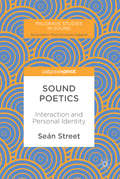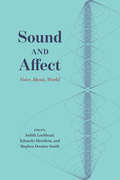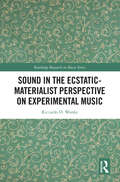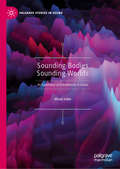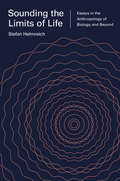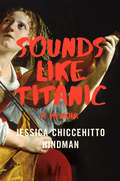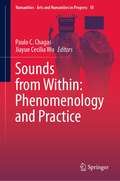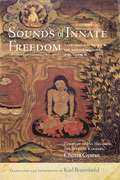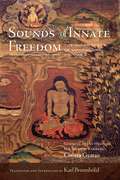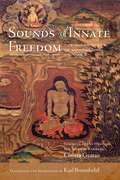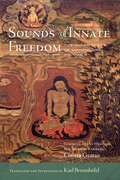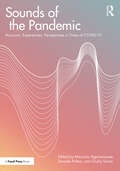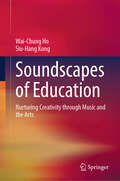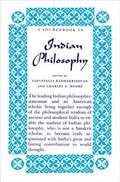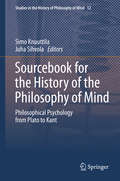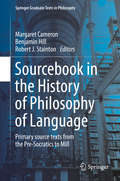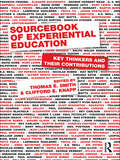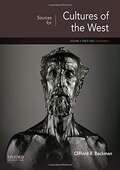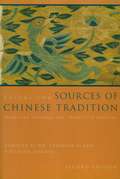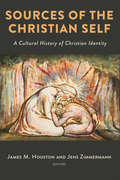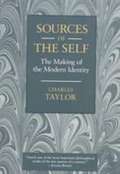- Table View
- List View
Sound Poetics
by Seán StreetThis book examines sonic signals as something both heard internally and externally, through imagination, memory and direct response. In doing so it explores how the mind 'makes' sound through experience, as it interprets codes on the written page, and creates an internal leitmotif that then interacts with new sounds made through an aural partnership with the external world, chosen and involuntary exposure to music and sound messages, both friendly and antagonistic to the identity of the self. It creates an argument for sound as an underlying force that links us to the world we inhabit, an essential part of being in the same primal sense as the calls of birds and other inhabitants of a shared earth. Street argues that sound as a poetic force is part of who we are, linked to our visualisation and sense of the world, as idea and presence within us. This incredibly interdisciplinary book will be of great interest to scholars of radio, sound, media and literature as well as philosophy and psychology.
Sound and Affect: Voice, Music, World
by Eduardo Mendieta Judith Lochhead Stephen Decatur SmithThere is no place on earth that does not echo with the near or distant sounds of human activity. More than half of humanity lives in cities, meaning the daily soundtrack of our lives is filled with sound—whether it be sonorous, harmonious, melodic, syncopated, discordant, cacophonous, or even screeching. This new anthology aims to explore how humans are placed in certain affective attitudes and dispositions by the music, sounds, and noises that envelop us. ?Sound and Affect maps a new territory for inquiry at the intersection of music, philosophy, affect theory, and sound studies. The essays in this volume consider objects and experiences marked by the correlation of sound and affect, in music and beyond: the voice, as it speaks, stutters, cries, or sings; music, whether vocal, instrumental, or machine-made; and our sonic environments, whether natural or artificial, and how they provoke responses in us. Far from being stable, correlations of sound and affect are influenced and even determined by factors as diverse as race, class, gender, and social and political experience. Examining these factors is key to the project, which gathers contributions from a cross-disciplinary roster of scholars, including both established and new voices. This agenda-setting collection will prove indispensable to anyone interested in innovative approaches to the study of sound and its many intersections with affect and the emotions.
Sound in the Ecstatic-Materialist Perspective on Experimental Music (Routledge Research in Music)
by Riccardo D. WankeWhat does a one hour contemporary orchestral piece by Georg Friedrich Haas have in common with a series of glitch-noise electronic tracks by Pan Sonic? This book proposes that, despite their differences, they share a particular understanding of sound that is found across several quite distinct genres of contemporary art music: the ecstatic-materialist perspective. Sound in the ecstatic-materialist perspective is considered as a material mass or element, unfolding in time, encountered by a listener, for whom the experience of that sound exceeds the purely sonic without becoming entirely divorced from its materiality. It is "material" by virtue of the focus on the texture, consistency, and density of sound; it is "ecstatic" in the etymological sense, that is to say that the experience of this sound involves an instability; an inclination to depart from material appearance, an ephemeral and transitory impulse in the very perception of sound to something beyond – but still related to – it. By examining musical pieces from spectralism to electroacoustic domains, from minimalism to glitch electronica and dubstep, this book identifies the key intrinsic characteristics of this musical perspective. To fully account for this perspective on sonic experience, listener feedback and interviews with composers and performers are also incorporated. Sound in the ecstatic-materialist perspective is the common territory where composers, sound artists, performers, and listeners converge.
Sounding Bodies Sounding Worlds: An Exploration of Embodiments in Sound (Palgrave Studies in Sound)
by Mickey ValleeWhat makes a body of sound appear as an aesthetic object as well as a method for knowledge? In Sounding Bodies Sounding Worlds, Mickey Vallee argues that we must impose our sonic imagination onto the non-sonic, and embrace how we sound to ourselves, sound with our animal companions, and sound in very earth itself. From the invention of the laryngoscope to the role of the spectrogram, from the call of the bird to the tumble of a rockslide, from the deep listening of environmental immersion to the computational listening of bioacoustics research, Vallee offers a wide range of cases to convincingly argue that all life shares in a continuous, embodied and ethical vibration.
Sounding the Limits of Life
by Stefan Helmreich Michele Friedner Sophia RoosthWhat is life? What is water? What is sound? In Sounding the Limits of Life, anthropologist Stefan Helmreich investigates how contemporary scientists--biologists, oceanographers, and audio engineers--are redefining these crucial concepts. Life, water, and sound are phenomena at once empirical and abstract, material and formal, scientific and social. In the age of synthetic biology, rising sea levels, and new technologies of listening, these phenomena stretch toward their conceptual snapping points, breaching the boundaries between the natural, cultural, and virtual.Through examinations of the computational life sciences, marine biology, astrobiology, acoustics, and more, Helmreich follows scientists to the limits of these categories. Along the way, he offers critical accounts of such other-than-human entities as digital life forms, microbes, coral reefs, whales, seawater, extraterrestrials, tsunamis, seashells, and bionic cochlea. He develops a new notion of "sounding"--as investigating, fathoming, listening--to describe the form of inquiry appropriate for tracking meanings and practices of the biological, aquatic, and sonic in a time of global change and climate crisis.Sounding the Limits of Life shows that life, water, and sound no longer mean what they once did, and that what count as their essential natures are under dynamic revision.
Sounds Like Titanic: A Memoir
by Jessica Chiccehitto HindmanA young woman leaves Appalachia for life as a classical musician—or so she thinks. When aspiring violinist Jessica Chiccehitto Hindman lands a job with a professional ensemble in New York City, she imagines she has achieved her lifelong dream. But the ensemble proves to be a sham. When the group “performs,” the microphones are never on. Instead, the music blares from a CD. The mastermind behind this scheme is a peculiar and mysterious figure known as The Composer, who is gaslighting his audiences with music that sounds suspiciously like the Titanic movie soundtrack. On tour with his chaotic ensemble, Hindman spirals into crises of identity and disillusionment as she “plays” for audiences genuinely moved by the performance, unable to differentiate real from fake. Sounds Like Titanic is a surreal, often hilarious coming-of-age story. Hindman writes with precise, candid prose and sharp insight into ambition and gender, especially when it comes to the difficulties young women face in a world that views them as silly, shallow, and stupid. As the story swells to a crescendo, it gives voice to the anxieties and illusions of a generation of women, and reveals the failed promises of a nation that takes comfort in false realities.
Sounds from Within: Phenomenology and Practice (Numanities - Arts and Humanities in Progress #18)
by Paulo C. Chagas Jiayue Cecilia WuThis book transforms phenomenology, music, technology, and the cultural arts from within. Gathering contributions by performing artists, media technology designers, nomadic composers, and distinguished musicological scholars, it explores a rich array of concepts such as embodiment, art and technology, mindfulness meditation, time and space in music, self and emptiness, as well as cultural heritage preservation. It does so via close studies on music phenomenology theory, works involving experimental music and technology, and related cultural and historical issues. This book will be of considerable interest to readers from the fields of sound studies, science and technology studies, phenomenology, cultural studies, media studies, and sound art theory. This book is equally relevant and insightful for musicians, composers, media artists, sound artists, technology designers, and curators and arts administrators from the performing and visual arts.
Sounds of Innate Freedom: The Indian Texts of Mahamudra, Vol. 5
by Karl BrunnhölzlThe first volume in an historic and noteworthy 6-volume series containing many of the first English translations of the classic mahamudra literature compiled by the Seventh Karmapa.Sounds of Innate Freedom: The Indian Texts of Mahamudra is an historic six-volume series containing many of the first English translations of classic Mahamudra literature. The texts and songs in these volumes constitute the large compendium called The Indian Texts of the Mahamudra of Definitive Meaning, compiled by the Seventh Karmapa, Chötra Gyatso (1456–1539). Mahamudra refers to perfect buddhahood in a single instant, the omnipresent essence of mind, nondual and free of obscuration. This collection offers a brilliant window into the richness of the vast ocean of Indian Mahamudra texts, many cherished in all Tibetan lineages, particularly in the Kagyü tradition, giving us a clear view of the sources of one of the world&’s great contemplative traditions. This first volume in publication contains the majority of songs of realization, consisting of dohas (couplets), vajragitis (vajra songs), and caryagitis (conduct songs), all lucidly expressing the inexpressible. These songs offer readers a feast of profound and powerful pith instructions uttered by numerous male and female mahasiddhas, yogis, and dakinis, often in the context of ritual ganacakras and initially kept in their secret treasury. Displaying a vast range of themes, styles, and metaphors , they all point to the single true nature of the mind—mahamudra—in inspiring ways and from different angles, using a dazzling array of skillful means to penetrate the sole vital point of buddhahood being found nowhere but within our own mind. The beautifully translated texts brilliantly capture the wordplay, mystical wonder, bliss, and ecstatic sense of freedom expressed by awakened Mahamudra masters of India. It includes works by Saraha, Mitrayogi, Virupa, Tilopa, Naropa, Maitripa, Nagarjuna, the female mahasiddhas princess Laksmimkara and Dombiyogini, and otherwise unknown awakened figures of this rich tradition. Reading and singing these songs that convey the inconceivable and contemplating their meaning in meditation will open doors to spiritual experience for us today just as it has for countless practitioners in the past.
Sounds of Innate Freedom: The Indian Texts of Mahamudra, Volume 2 (Sounds of Innate Freedom #2)
by Karl BrunnhölzlThe second volume in a historic six-volume series containing many of the first English translations of the classic Mahamudra literature compiled by the Seventh Karmapa.Sounds of Innate Freedom: The Indian Texts of Mahamudra are historic volumes containing many of the first English translations of the classic Mahamudra literature. The texts and songs in these volumes constitute the large compendium called The Indian Texts of the Mahamudra of Definitive Meaning, compiled by the Seventh Karmapa Chötra Gyatso (1456–1539). Translated, introduced, and annotated by Karl Brunnhölzl, acclaimed senior teacher at the Nalandabodhi community of Dzogchen Ponlop Rinpoche, the collection offers a brilliant window into the richness of the vast ocean of Indian Mahamudra texts cherished in all Tibetan lineages, particularly in the Kagyü tradition, giving us a clear view of the sources of one of the world&’s great contemplative traditions. This volume 2 (thirty-four texts) contains two long-established sets of Mahamudra works: &“The Sixfold Pith Cycle&” and short texts of Maitripa&’s &“Twenty-Five Dharmas of Mental Nonengagement,&” which present a blend of Madhyamaka, Mahamudra, and certain tantric principles, as well as two commentaries by Maitripa&’s students. The vital focus of this volume is the accomplishment of true reality.
Sounds of Innate Freedom: The Indian Texts of Mahamudra, Volume 3
by Karl BrunnhölzlThe third volume in a historic six-volume series containing many of the first English translations of the classic mahamudra literature compiled by the Seventh Karmapa.Sounds of Innate Freedom: The Indian Texts of Mahamudra are historic volumes containing many of the first English translations of the classic mahamudra literature. The texts and songs in these volumes constitute the large compendium called The Indian Texts of the Mahamudra of Definitive Meaning, compiled by the Seventh Karmapa Chötra Gyatso (1456–1539). Translated, introduced, and annotated by Karl Brunnhölzl, acclaimed senior teacher at the Nalandabodhi community of Dzogchen Ponlop Rinpoche, the collection offers a brilliant window into the richness of the vast ocean of Indian mahamudra texts cherished in all Tibetan lineages, particularly in the Kagyu tradition, giving us a clear view of the sources of one of the world&’s great contemplative traditions. This third volume contains twenty-four texts, the bulk of which are dohas by Saraha and commentaries on them, as well as works by other renowned Indian Buddhist mahasiddhas such as Naropa, Krsna, and Sakyasribhadra. The extensive commentaries brilliantly unravel enigmas and bring clarity to the songs they comment on as well as to many other songs of realization in the series. These expressive songs of the inexpressible offer readers a feast of profound and powerful pith instructions uttered by numerous male and female mahasiddhas, yogis, and dakinis, often in the context of ritual ganacakras and initially kept in their secret treasury. Displaying a vast range of themes, styles, and metaphors, they all point to the single true nature of the mind—mahamudra—in inspiring ways and from different angles, using a dazzling array of skillful means to penetrate the sole vital point of buddhahood being found nowhere but within our own mind. Reading and singing these songs of mystical wonder, bliss, and ecstatic freedom and contemplating their meaning will open doors to spiritual experience for us today just as it has for countless practitioners in the past.
Sounds of Innate Freedom: The Indian Texts of Mahamudra, Volume 4
by Karl BrunnhölzlThe second volume in an historic and noteworthy 6-volume series containing many of the first English translations of the classic mahamudra literature compiled by the Seventh Karmapa as well as extensive commentary that brilliantly unravels enigmas and clarifies cryptic verses.Sounds of Innate Freedom: The Indian Texts of Mahamudra are historic volumes containing many of the first English translations of classic mahamudra literature. The texts and songs in these volumes constitute the large compendium called The Indian Texts of the Mahamudra of Definitive Meaning, compiled by the Seventh Karmapa, Chötra Gyatso (1456–1539). The collection offers a brilliant window into the richness of the vast ocean of Indian mahamudra texts cherished in all Tibetan lineages, particularly in the Kagyü tradition, giving us a clear view of the sources of one of the world&’s great contemplative traditions. Besides the individual dohas (couplets), vajragitis (vajra songs), and caryagitis (conduct songs) in this second volume in publication, the three extensive commentaries it contains brilliantly unravel enigmas and bring clarity not only to the specific songs they comment on but to many other, often cryptic, songs of realization in this collection. These expressive songs of the inexpressible offer readers a feast of profound and powerful pith instructions uttered by numerous male and female mahasiddhas, yogis, and dakinis, often in the context of ritual ganacakras and initially kept in their secret treasury. Displaying a vast range of themes, styles, and metaphors, they all point to the single true nature of the mind—mahamudra—in inspiring ways and from different angles, using a dazzling array of skillful means to penetrate the sole vital point of buddhahood being found nowhere but within our own mind. Reading and singing these songs of mystical wonder, bliss, and ecstatic freedom, and contemplating their meaning, will open doors to spiritual experience for us today just as it has for countless practitioners in the past.
Sounds of the Pandemic: Accounts, Experiences, Perspectives in Times of COVID-19
by Maurizio Agamennone Daniele Palma Giulia SarnoSounds of the Pandemic offers one of the first critical analyses of the changes in sonic environments, artistic practice, and listening behaviour caused by the Coronavirus outbreak. This multifaceted collection provides a detailed picture of a wide array of phenomena related to sound and music, including soundscapes, music production, music performance, and mediatisation processes in the context of COVID-19. It represents a first step to understanding how the pandemic and its by-products affected sound domains in terms of experiences and practices, representations, collective imaginaries, and socio-political manipulations. This book is essential reading for students, researchers, and practitioners working in the realms of music production and performance, musicology and ethnomusicology, sound studies, and media and cultural studies.
Soundscapes of Education: Nurturing Creativity through Music and the Arts
by Wai-Chung Ho Siu-Hang KongThis book focuses on nurturing students&’ creativity through the integration of music and other creative art forms. It presents the soundscape as an immersive auditory environment that surrounds us, capable of evoking emotions, stimulating imagination, and inspiring creative thought. By actively engaging with the soundscape while listening to music or the sound environment, individuals can enhance their creative experiences and discover new avenues for exploration and expression in teaching. Additionally, the book explores creativity within the soundscapes of diverse cultures, broadening students&’ perspectives, while promoting cultural awareness, empathy, and interconnectedness. The book pays particular attention to the Chinese community while considering its relevance in both Western and non-Western contexts. It emphasizes the influential role of teachers and the social environment in motivating creativity and creative behaviour, risk-taking, and innovative problem-solving skills. The book also showcases a comprehensive programme with resources for facilitating creative music-making, providing detailed insights into how creativity can be effectively sustained, stimulated, and promoted within the education system.
Sour Grapes
by Jon ElsterDrawing on philosophy, political and social theory, decision-theory, economics, psychology, history and literature, Jon Elster's classic book Sour Grapes continues and complements the arguments of his acclaimed earlier book, Ulysses and the Sirens. Elster begins with an analysis of the notation of rationality, before tackling the notions of irrational behavior, desires and belief with highly sophisticated arguments that subvert the orthodox theories of rational choice. Presented in a fresh series livery and with a specially commissioned preface written by Richard Holton, illuminating its continuing importance to philosophical enquiry, Sour Grapes has been revived for a new generation of readers.
Sourcebook In Indian Philosophy
by Sarvepalli Radhakrishnan Charles A. Moore<P>GENERALLY speaking, Western students of Indian philosophy are limited to secondary sources and to a few primary sources, such as translations of the Rg Veda, the more important Upanisads, and the Bhagavad-gītā.
Sourcebook for the History of the Philosophy of Mind
by Juha Sihvola Simo KnuuttilaFresh translations of key texts, exhaustive coverage from Plato to Kant, and detailed commentary by expert scholars of philosophy add up to make this sourcebook the first and most comprehensive account of the history of the philosophy of mind. Published at a time when the philosophy of mind and philosophical psychology are high-profile domains in current research, the volume will inform our understanding of philosophical questions by shedding light on the origins of core conceptual assumptions often arrived at before the instauration of psychology as a recognized subject in its own right. The chapters closely follow historical developments in our understanding of the mind, with sections dedicated to ancient, medieval Latin and Arabic, and early modern periods of development. The volume's structural clarity enables readers to trace the entire progression of philosophical understanding on specific topics related to the mind, such as the nature of perception. Doing so reveals the fascinating contrasts between current and historical approaches. In addition to its all-inclusive source material, the volume provides subtle expert commentary that includes critical introductions to each thematic section as well as detailed engagement with the central texts. A voluminous bibliography includes hundreds of primary and secondary sources. The sheer scale of this new publication sheds light on the progression, and discontinuities, in our study of the philosophy of mind, and represents a major new sourcebook in a field of extreme importance to our understanding of humanity as a whole.
Sourcebook for the History of the Philosophy of Mind: Philosophical Psychology from Plato to Kant (Studies in the History of Philosophy of Mind #12)
by Juha Sihvola Simo KnuuttilaFresh translations of key texts, exhaustive coverage from Plato to Kant, and detailed commentary by expert scholars of philosophy add up to make this sourcebook the first and most comprehensive account of the history of the philosophy of mind. Published at a time when the philosophy of mind and philosophical psychology are high-profile domains in current research, the volume will inform our understanding of philosophical questions by shedding light on the origins of core conceptual assumptions often arrived at before the instauration of psychology as a recognized subject in its own right. The chapters closely follow historical developments in our understanding of the mind, with sections dedicated to ancient, medieval Latin and Arabic, and early modern periods of development. The volume’s structural clarity enables readers to trace the entire progression of philosophical understanding on specific topics related to the mind, such as the nature of perception. Doing so reveals the fascinating contrasts between current and historical approaches. In addition to its all-inclusive source material, the volume provides subtle expert commentary that includes critical introductions to each thematic section as well as detailed engagement with the central texts. A voluminous bibliography includes hundreds of primary and secondary sources. The sheer scale of this new publication sheds light on the progression, and discontinuities, in our study of the philosophy of mind, and represents a major new sourcebook in a field of extreme importance to our understanding of humanity as a whole.
Sourcebook in the History of Philosophy of Language
by Robert J. Stainton Benjamin Hill Margaret CameronFor the first time in English, this anthology offers a comprehensive selection of primary sources in the history of philosophy of language. Beginning with a detailed introduction contextualizing the subject, the editors draw out recurring themes, including the origin of language, the role of nature and convention in fixing form and meaning, language acquisition, ideal languages, varieties of meanings, language as a tool, and the nexus of language and thought, linking them to representative texts. The handbook moves on to offer seminal contributions from philosophers ranging from the pre-Socratics up to John Stuart Mill, preceding each major historical section with its own introductory assessment. With all of the most relevant primary texts on the philosophy of language included, covering well over two millennia, this judicious, and generous, selection of source material will be an indispensable research tool for historians of philosophy, as well as for philosophers of language, in the twenty-first century. A vital tool for researchers and contemporary philosophers, it will be a touchstone for much further research, with coverage of a long and varied tradition that will benefit today's scholars and enhance their awareness of earlier contributions to the field.
Sourcebook of Experiential Education: Key Thinkers and Their Contributions
by Thomas E. SmithExperiential education is a philosophy and methodology for building knowledge, developing skills, and clarifying values by engaging learners in direct experience and focused reflection. To understand experiential education, what should one be reading? This sourcebook introduces philosophers, educators, and other practitioners whose work is relevant to anyone seeking answers to this question. Following brief snapshots of John Dewey and Kurt Hahn, the book is organized in four sections: Philosophers and Educational Theorists Nature Educators and Outdoor Educators Psychologists and Sociologists School and Program Founders. Each chapter focuses on an individual whose philosophy and practice exemplify a biographical and historical model for reaching a deeper understanding of experiential education. An appendix includes short biographical sketches of forty-five additional people whose contributions to experiential education deserve a closer look. This volume provides a much-needed overview and foundations for the field – for students in courses addressing experiential education, challenge education, outdoor experiential education, recreation education, and related fields; for learning theorists and curriculum specialists; for experiential educators; and for educational philosophers.
Sources for Cultures of the West: Volume 2: Since 1350
by Clifford R. Backman Christine AxenDesigned to accompany Cultures of the West: Volume 1: To 1750, Third Edition (2019), and Cultures of the West: Volume 2: Since 1350, Third Edition (2019), by Clifford R. Backman, the third editions of Sources for Cultures of the West, Volume 1: To 1750 and Sources for Cultures of the West,Volume 2: Since 1350 feature approximately six written sources per chapter that highlight key themes in the study of Western civilization. Each of the 189 sources is accompanied by a headnote. Each volume begins with a special unit, "How to Read a Primary Source," that provides students withimportant advice on how to work with textual documents in studying the past. The third edition includes twenty-one new sources.
Sources in The Development of Mathematics
by Ranjan RoyThe discovery of infinite products by Wallis and infinite series by Newton marked the beginning of the modern mathematical era. It allowed Newton to solve the problem of finding areas under curves defined by algebraic equations, an achievement beyond the scope of the earlier methods of Torricelli, Fermat and Pascal. While Newton and his contemporaries, including Leibniz and the Bernoullis, concentrated on mathematical analysis and physics, Euler's prodigious accomplishments demonstrated that series and products could also address problems in algebra, combinatorics and number theory. In this book, Ranjan Roy describes many facets of the discovery and use of infinite series and products as worked out by their originators, including mathematicians from Asia, Europe and America. The text provides context and motivation for these discoveries, with many detailed proofs, offering a valuable perspective on modern mathematics. Mathematicians, mathematics students, physicists and engineers will all read this book with benefit and enjoyment.
Sources of Chinese Tradition: From 1600 Through the Twentieth Century (Introduction to Asian Civilizations #Volume 2)
by Richard Lufrano Wm. Theodore de BaryFor four decades Sources of Chinese Tradition has served to introduce Western readers to Chinese civilization as it has been seen through basic writings and historical documents of the Chinese themselves. Now in its second edition, revised and extended through Deng Xiaoping and Jiang Zemin–era China, this classic volume remains unrivaled for its wide selection of source readings on history, society, and thought in the world's largest nation. Award-winning China scholar Wm. Theodore de Bary—who edited the first edition in 1960—and his coeditor Richard Lufrano have revised and updated the second volume of Sources to reflect the interactions of ideas, institutions, and historical events from the seventeenth century up to the present day. <p><p> Beginning with Qing civilization and continuing to contemporary times, volume II brings together key source texts from more than three centuries of Chinese history, with opening essays by noted China authorities providing context for readers not familiar with the period in question. <p> Here are just a few of the topics covered in this second volume of Sources of Chinese Tradition: Early Sino-Western contacts in the seventeenth century; Four centuries of Chinese reflections on differences between Eastern and Western civilizations; Nineteenth- and twentieth-century reform movements, with treatises on women's rights, modern science, and literary reform; Controversies over the place of Confucianism in modern Chinese society; The nationalist revolution—including readings from Sun Yat-sen and Chiang Kai-shek; The communist revolution—with central writings by Mao Zedong; Works from contemporary China—featuring political essays from Deng Xiaoping and dissidents including Wei Jingsheng. <p> With more than two hundred selections in lucid, readable translation by today's most renowned experts on Chinese language and civilization, Sources of Chinese Tradition will continue to be recognized as the standard for source readings on Chinese civilization, an indispensable learning tool for scholars and students of Asian civilizations.
Sources of Knowledge
by Andrea KernHow can human beings, who are liable to error, possess knowledge, since the grounds on which we believe do not rule out that we are wrong? Andrea Kern argues that we can disarm this skeptical doubt by conceiving knowledge as an act of a rational capacity. In this book, she develops a metaphysics of the mind as existing through knowledge of itself.
Sources of the Christian Self: A Cultural History of Christian Identity
by James M. Houston, Jens ZimmermannUsing Charles Taylor&’s magisterial Sources of the Self: The Making of the Modern Identity as a springboard, this interdisciplinary book explores lived Christian identity through the ages. Beginning with such Old Testament figures as Abraham, Moses, and David and moving through the New Testament, the early church, the Middle Ages, and onward, the forty-two biographical chapters in Sources of the Christian Self illustrate how believers historically have defined their selfhood based on their relation to God/Jesus. Among the many historical subjects are Justin Martyr, Origen, Augustine, Aquinas, Julian of Norwich, Dante, John Calvin, Teresa of Ávila, John Bunyan, Jonathan Edwards, Christina Rossetti, Blaise Pascal, Søren Kierkegaard, C. S. Lewis, and Flannery O&’Connor—all of whom boldly lived out their Christian identities in their varied cultural contexts. In showing how Christian identity has evolved over time, Sources of the Christian Self offers deep insight into our own Christian selves today.CONTRIBUTORS: Markus Bockmuehl Keith Bodner Gerald P. Boersma Hans Boersma Robert H. Bork Paul C. Burns Julie Canlis Victor I. Ezigbo Craig M. Gay Yonghua Ge Christopher Hall Ross Hastings Bruce Hindmarsh James M. Houston Sharon Jebb Smith Robert A. Kitchen Marian Kamell Kovalishyn Pak-Wah Lai Jay Langdale Bo Karen Lee Jonathan Sing-cheung Li V. Phillips Long Howard Louthan Elizabeth Ludlow Eleanor McCullough Stephen Ney Ryan S. Olson Steve L. Porter Iain Provan Murray Rae Jonathan Reimer Ronald T. Rittgers Sven Soderlund Janet Martin Soskice Mikael Tellbe Colin Thompson Bruce K. Waltke Steven Watts Robyn Wrigley-Carr Jens Zimmermann
Sources of the Self: The Making of the Modern Identity
by Charles TaylorIn this extensive inquiry into the sources of modern selfhood, Charles Taylor demonstrates just how rich and precious those resources are. The modern turn to subjectivity, with its attendant rejection of an objective order of reason, has led--it seems to many--to mere subjectivism at the mildest and to sheer nihilism at the worst. Many critics believe that the modern order has no moral backbone and has proved corrosive to all that might foster human good. Taylor rejects this view. He argues that, properly understood, our modern notion of the self provides a framework that more than compensates for the abandonment of substantive notions of rationality. The major insight of Sources of the Self is that modern subjectivity, in all its epistemological, aesthetic, and political ramifications, has its roots in ideas of human good. Sources of the Self provides a decisive defense of the modern order and a sharp rebuff to its critics.
